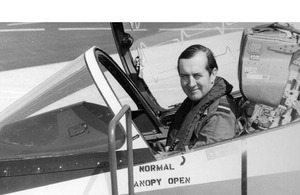A 40-year RAF career
From World War Two and the Cold War stand-off to the Falklands, Sir Michael Beetham has been at the centre of events that have shaped the world.

Sir Michael Beetham in the cockpit of a Hawk at RAF Valley in 1973 [Picture: via MOD]
After a 40-year career that began and ended in conflict on the world stage, Sir Michael Beetham survives as one of four men to hold the rank of Marshal of the Royal Air Force.
It could have been so different, but for an accident of birth. Men born after 1927 were too young to serve in the Second World War. They inherited a secure peacetime Britain keen to forget the nightmare of Hitler. For those born earlier, fate offered a very different prospect - total war against the Nazis.
Beetham’s birth date set a trajectory that propelled him into the heart of the European maelstrom.
Before the age of 21 he had completed a tour as a Lancaster pilot with Bomber Command which earned him the Distinguished Flying Cross before he was even able to drive a car.
Nearly four decades later, as Air Chief Marshal Sir Michael Beetham, and the most senior officer in the RAF, he masterminded the legendary Vulcan raid on Stanley in the Falkland Islands. It was a mission that succeeded against the odds and turned the tide of the conflict - dealing a demoralising blow to the Argentinian forces. However, he admits that had he been born later he would probably have become a Home Counties solicitor with a penchant for golf.
Born in London in 1923, Beetham’s outstanding RAF career began in 1941.
He initially trained in the United States before joining 50 Squadron in 1943 - just in time to take part in the Battle of Berlin.
Further Lancaster tours followed, and, having completed Staff College in 1953, he was posted to the Air Ministry where he was involved in the development of the PR variants of the Canberra and the introduction into service of the new V-bombers.
His presence at the nuclear trials at Maralinga in Australia where he witnessed four atomic detonations affected him profoundly. He came to believe that it would never be practicable to impose limits on a nuclear war.
Beetham was then given command of 214 Squadron at RAF Marham, equipped with the Valiant, with the task of developing the RAF’s air-to-air refuelling capability, and this culminated in 1959 when he flew the first non-stop flight from the UK to Cape Town in a record-breaking time of less than 11.5 hours. This, and his other long-range flights, provided a convincing demonstration of the feasibility and the potential of air-to-air refuelling for which he was awarded the Air Force Cross.
He then served at the heart of Bomber Command’s affairs when the world teetered on the brink of nuclear war during the Cuban Missile Crisis in 1962.
In 1964 Beetham was given command of the strategically important base of Khormaksar in the Middle East, the RAF’s biggest overseas station, at the time terrorists launched attacks against British forces in Aden.
More senior appointments followed, including Commandant of the Staff College, before he took up a NATO appointment at SHAPE in Belgium as Assistant Chief of Staff (Plans & Policy) - the first British officer to hold the post.
His return home in 1975, as Deputy Commander-in-Chief Strike Command, was short-lived as he was soon appointed Commander Second Allied Tactical Air Force and Commander-in-Chief RAF Germany.
Already conversant with much of the situation in Germany from his earlier days at SHAPE, he was now in charge of one of NATO’s main air forces.
The highest accolade came in 1977 when Sir Michael was appointed Chief of the Air Staff (CAS). Recognising that recent heavy cuts had seriously impaired morale he had to address the problems of pay, which were seriously hindering recruitment and causing an exodus of skilled people.
Another challenge followed after the election of the Thatcher Government in 1979 and its first major defence review.
While these and other major issues, such as the purchase of Trident and the deployment of Cruise missiles, were being debated at the highest level, there were many RAF matters requiring his attention, such as the introduction of Tornado, which he had to defend against much unjustified criticism during its early days.
Air defence, too, was still far from satisfactory and the purchase of the Chinook and the stretching of the Hercules were amongst other important measures.
By 1982 he was preparing to hand over as CAS when Argentina invaded the Falkland Islands and, as Acting Chief of the Defence Staff, he was immediately involved in the decision to send the Task Force into battle. After victory in the Falklands, Sir Michael handed over as CAS and was appointed Marshal of the Royal Air Force.
From his home in Norfolk he has continued to work tirelessly for many organisations, specifically the RAF Museum, and, as President of the Bomber Command Association, he continues to lead the campaign for the Bomber Command Memorial in London.
‘Stay the Distance: The Life and Times of Marshal of the Royal Air Force Sir Michael Beetham’, written by Wing Commander Peter Jacobs, with the foreword by the Head of the Air Historical Branch, Sebastian Cox, is published in hardback by Frontline Books.